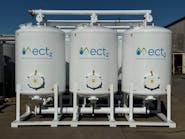The California State Water Resources Control Board has voted unanimously to adopt new regulations for direct potable reuse.
Approved on Tuesday, Dec. 19, the direct potable reuse regulations will allow water systems to develop treatment protocols to convert wastewater into drinking water. The approved regulations will bolster state drinking water supplies, making regional water systems more drought-resilient.
“This is an exciting development in the state’s ongoing efforts to find innovative solutions to the challenges of extreme weather driven by climate change,” said E. Joaquin Esquivel, chair of the State Water Board, in a press release. “On top of helping us build drought-resilient water supplies, direct potable reuse offers energy savings and environmental benefits. And most importantly, these regulations ensure that the water produced is not only safe, but purer than many drinking water sources we now rely on.”
California water systems have already deployed many indirect potable reuse projects, where treated wastewater is treated through long-term underground storage or through dilution with surface water. Such projects include Regional San EchoWater, Pure Water Oceanside and many more.
“These new regulations are a tremendous step forward as we develop Pure Water Southern California, which will be one of the largest recycled water facilities in the world and benefit 19 million people in our service area,” said Deven Upadhyay, executive officer of the Metropolitan Water District of Southern California and vice president of the WateReuse Association. “Pursuing direct potable reuse for a portion of the supplies produced at our Pure Water facility will allow us to better manage the weather extremes we face from a changing climate. We applaud the state board for developing this new resource, while making public health the top priority.”
Direct potable reuse projects, however, could not be initiated in California until these regulations were adopted. Direct potable reuse utilizes an immediate treatment to recycle wastewater to drinking water standards in hours.
“As Colorado River Basin States grapple with the most severe drought in 1,200 years, Californian regulators have decided to allow water agencies to recycle wastewater for use as drinking water,” says Josh Mahan, Xylem’s director of government and industry relations. “Allowing direct potable use is a significant step towards securing the state’s water supply and could lead the way for other western states facing water stress.”
Mahan says that California is only the second U.S. state, after Colorado, to allow purified wastewater to be returned directly to the drinking water system.
Colorado had approved direct potable reuse regulations in January 2023. However, according to The Hill, no utilities in Colorado have yet made use of the regulations.
“Water reuse is a viable option for every state — regardless of geography or geology — to help secure water supplies,” says Mahan. “It decreases the need to transport water over long distances to cities, and reduces the need to extract water from rivers, lakes and increasingly depleted underground sources.”




